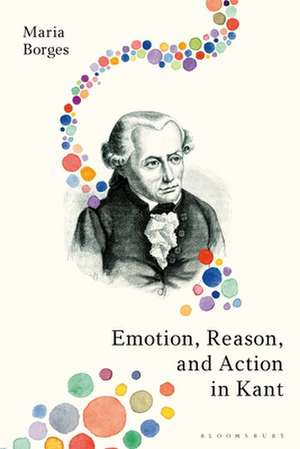Emotion, Reason, and Action in Kant
Autor Dr Maria Borgesen Limba Engleză Paperback – 28 oct 2020
| Toate formatele și edițiile | Preț | Express |
|---|---|---|
| Paperback (1) | 223.58 lei 6-8 săpt. | |
| Bloomsbury Publishing – 28 oct 2020 | 223.58 lei 6-8 săpt. | |
| Hardback (1) | 656.23 lei 6-8 săpt. | +129.31 lei 6-12 zile |
| Bloomsbury Publishing – 17 apr 2019 | 656.23 lei 6-8 săpt. | +129.31 lei 6-12 zile |
Preț: 223.58 lei
Preț vechi: 288.27 lei
-22% Nou
Puncte Express: 335
Preț estimativ în valută:
42.78€ • 44.67$ • 35.41£
42.78€ • 44.67$ • 35.41£
Carte tipărită la comandă
Livrare economică 04-18 aprilie
Preluare comenzi: 021 569.72.76
Specificații
ISBN-13: 9781350212305
ISBN-10: 135021230X
Pagini: 224
Dimensiuni: 156 x 234 mm
Greutate: 0.31 kg
Editura: Bloomsbury Publishing
Colecția Bloomsbury Academic
Locul publicării:London, United Kingdom
ISBN-10: 135021230X
Pagini: 224
Dimensiuni: 156 x 234 mm
Greutate: 0.31 kg
Editura: Bloomsbury Publishing
Colecția Bloomsbury Academic
Locul publicării:London, United Kingdom
Caracteristici
Prioritizes the importance of emotion in Kant's philosophy, a growing area within philosophy.
Notă biografică
Maria Borges is Professor of Philosophy at the University of Santa Catarina, Brazil.
Cuprins
Acknowledgements AbbreviationsTranslationsIntroduction1. Action, reason, and causes in Kant2. Can we act without feelings? Respect, sympathy, and other forms of Love 3. A place for affects and passions in the Kantian system4. What can Kant teach us about emotions?5. Physiology and the Controlling of Affects in Kant's Philosophy6. Kantian Virtue as a Cure for Affects and Passions7. The beautiful and the good: refinement as a propaedeutic to morality8. Women and Emotion9. Evil and PassionsConclusion: An emotional Kant?NotesReferencesIndex
Recenzii
English-language readers now have the opportunity to learn about Brazilian philosopher Maria Borges's groundbreaking work on Kant and the emotions. In Emotion, Reason and Action in Kant - her first book in English - she expands and deepens her investigations into an underexplored side of Kant that is unfortunately still foreign territory for many of Kant's friends as well as foes.
Among the recently increasing number of works on Kant on emotion, Borges's book is the most wide-ranging and insightful yet. Drawing on the full range of Kant's work in moral philosophy, anthropology, and aesthetics, she brings out the complexity of Kant's conception of what we now call the emotions and of the relation between his view of the emotions and his transcendental idealist theory of free will. A bonus is her demonstration that in spite of well-taken feminist critiques of Kant, he also allotted an indispensable role to women in the moral education of humankind at large. Borges convincingly argues that Kant made enduring contributions to our understanding of the nature and importance of human emotions.
Wide-ranging in topics and scholarship, Emotion, Reason and Action in Kant develops Maria Borges's initially shocking claim that we can learn something about the emotions from Kant. Since, as she argues, any adequate account of Kant's moral psychology must include his views about the roles of different emotions in moral life, Borges's book will be valuable to many.
Among the recently increasing number of works on Kant on emotion, Borges's book is the most wide-ranging and insightful yet. Drawing on the full range of Kant's work in moral philosophy, anthropology, and aesthetics, she brings out the complexity of Kant's conception of what we now call the emotions and of the relation between his view of the emotions and his transcendental idealist theory of free will. A bonus is her demonstration that in spite of well-taken feminist critiques of Kant, he also allotted an indispensable role to women in the moral education of humankind at large. Borges convincingly argues that Kant made enduring contributions to our understanding of the nature and importance of human emotions.
Wide-ranging in topics and scholarship, Emotion, Reason and Action in Kant develops Maria Borges's initially shocking claim that we can learn something about the emotions from Kant. Since, as she argues, any adequate account of Kant's moral psychology must include his views about the roles of different emotions in moral life, Borges's book will be valuable to many.
